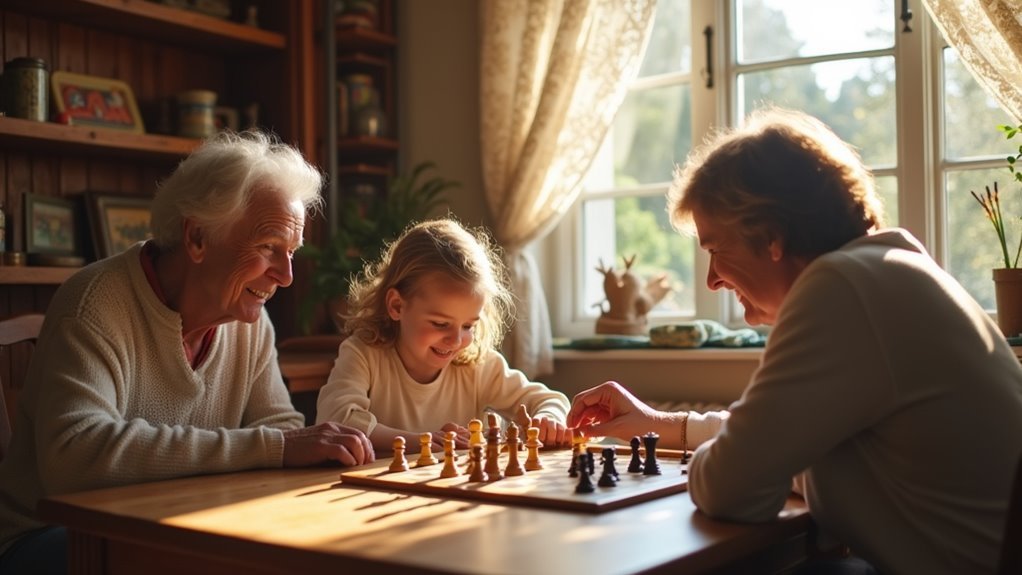Classic board games like Monopoly, Scrabble, and Clue naturally bridge generational gaps by creating shared experiences where you’ll find common ground with family members of all ages. These timeless games dissolve the barriers between grandparents, parents, and children while building essential skills like strategic thinking, communication, and patience. You’ll discover that regular game nights provide tech-free environments where meaningful connections flourish through friendly competition and cooperative play, establishing traditions that create lasting memories across your family’s generations.
The Enduring Appeal of Classic Board Games

Countless families have gathered around kitchen tables for decades, rolling dice and moving game pieces in timeless rituals that bridge generations.
You’ll find that classic board games like Monopoly, Scrabble, and Clue possess an enduring magic that transcends age barriers. These games don’t just entertain—they strengthen family bonds through shared experiences and friendly competition.
Board games create magical moments that unite families across generations through shared laughter, friendly rivalry, and unforgettable memories.
When you introduce these games to your children, you’re passing down more than rules and strategies. You’re creating lasting memories that they’ll carry forward to their own families.
The beauty lies in their simplicity and accessibility. Whether you’re teaching a preschooler Candy Land or challenging teenagers to Connect 4, these games adapt to different skill levels while maintaining their fundamental appeal across generations.
Modern Family Challenges and Digital Distractions
While classic board games maintain their timeless appeal, today’s families face unprecedented obstacles that make gathering around the game table increasingly difficult.
You’re juggling work schedules that conflict with your children’s activities, leaving little room for quality time together. When you do find moments to connect, generational gaps in interests create additional hurdles in choosing activities everyone enjoys.
Digital distractions pose perhaps the biggest threat to strengthening family ties. Your smartphones and tablets constantly compete for attention, pulling family members into separate digital worlds rather than fostering meaningful connections.
Face-to-face communication suffers as screens dominate your interactions.
However, establishing regular game nights offers a powerful solution, creating tech-free environments where all ages can participate equally and rebuild those essential bonds.
How Games Bridge Generational Gaps

Board games possess a unique ability to dissolve generational barriers, creating shared experiences where your teenager’s quick reflexes complement your parent’s strategic wisdom.
When you gather around a Monopoly board or engage in Scrabble matches, games bring together different perspectives and skills naturally. Your grandchildren learn patience and strategy from older family members, while adults rediscover playfulness and spontaneity.
These interactions create meaningful connections beyond everyday conversations. Simple rules in classics like Connect 4 guarantee everyone participates equally, regardless of age or experience.
Board games create authentic moments where age differences disappear and genuine family connections flourish through shared play.
Through regular game nights, you establish a cherished family tradition that prioritizes face-to-face interaction over digital distractions. Strategic games like Chess provide mentoring opportunities, while collaborative games like Pictionary encourage communication and teamwork, strengthening intergenerational bonds through laughter and friendly competition.
Essential Skills Developed Through Gameplay
Beyond entertainment, gameplay transforms into a powerful educational tool that sharpens essential life skills across all ages.
You’ll develop strategic thinking as you assess scenarios and make quick decisions during gameplay. Classic games like Monopoly teach money management, while Scrabble enhances vocabulary—skills that benefit all family members regardless of age.
Through cooperative games, you’ll strengthen teamwork and communication abilities while learning to collaborate toward shared objectives.
Board games naturally teach patience and turn-taking, building emotional resilience that serves you well beyond game night. The friendly competition cultivates sportsmanship, helping your family navigate victories and defeats gracefully.
These experiences create lasting bonds while developing problem-solving abilities that translate directly into real-world situations you’ll encounter throughout life.
Top Traditional Games Every Family Should Own

Understanding these skill-building benefits helps you choose games that’ll serve your family for years to come.
These timeless games bridge generational gaps while delivering lasting entertainment value.
Monopoly remains essential for teaching money management and negotiation skills since 1935.
Nearly nine decades of family entertainment proves Monopoly’s enduring value in developing essential financial literacy and strategic thinking skills.
Scrabble enhances vocabulary and creativity through strategic word-building from letter tiles.
Chess offers unmatched intellectual challenge, fostering critical thinking across all ages with its centuries-old strategic depth.
Clue combines mystery-solving with deductive reasoning, perfect for families seeking engaging narratives alongside strategic gameplay.
For younger players, Candy Land provides an ideal starting point, promoting color recognition and turn-taking skills through simplified mechanics.
Each family game delivers unique educational benefits while creating shared experiences.
You’ll find these classics consistently engage multiple generations, making them worthwhile investments for building stronger family connections.
The Cultural Significance of Card Games Like Rummy
While board games capture attention in family game nights, card games like Rummy carry profound cultural weight that spans continents and centuries. You’ll find Rummy deeply embedded in Asian and European traditions, particularly in India where it’s central to weddings, festivals, and family gatherings.
When you play Rummy, you’re participating in a tradition that naturally brings families together through accessible rules and simple setup requirements.
These games offer more than entertainment—they’re educational tools where elders teach valuable life lessons about strategy, patience, and social interaction to younger generations.
You can now maintain these connections through online platforms, allowing distant families to preserve traditions while developing critical thinking skills. Rummy demonstrates how card games strengthen family bonds across both physical distances and generational gaps.
Learning From Elders: Passing Down Game Traditions
When your grandmother sits across from you with a deck of cards, she’s not just teaching you how to form sequences—she’s passing down generations of wisdom embedded in every shuffle and deal. Learning from elders during game nights transforms simple card games into profound educational experiences.
You’ll discover that mastering pure sequences isn’t merely about winning—it’s about patience, strategy, and careful observation. These sessions create cherished memories that extend far beyond gameplay mechanics.
Your elder family members share stories between turns, weaving family history into strategic lessons. They’ll teach you when to hold cards and when to fold, mirroring life’s difficult decisions. Through Rummy and similar games, you’re absorbing cultural values, developing critical thinking skills, and strengthening family bonds that’ll influence your own future generations.
Choosing Age-Appropriate Games for Mixed Groups
Since family gatherings bring together players spanning multiple generations, you’ll need games that bridge the gap between your eight-year-old nephew’s enthusiasm and your grandfather’s strategic mind.
Selecting age-appropriate games for mixed family groups requires careful consideration of complexity levels and engagement factors.
- Simple rules with strategic depth – Choose classics like Monopoly or Scrabble that offer basic mechanics younger players can grasp while providing sophisticated strategies for experienced gamers.
- Adjustable complexity options – Look for games allowing different skill levels to participate meaningfully without frustration.
- Cooperative gameplay – Consider titles like Pandemic where family members work together toward common goals, eliminating competitive tensions.
- Accommodating player counts – Guarantee games include everyone without leaving family members sitting out.
These approaches create inclusive gaming experiences everyone enjoys.
Cooperative Vs Competitive Gaming Experiences
When you’re planning your next family game night, you’ll face a key decision: should you choose cooperative games that bring everyone together toward a shared goal, or competitive games that spark friendly rivalry?
Cooperative experiences like Pandemic create opportunities for you to build stronger family bonds as multiple generations work as a team, while competitive games such as Scrabble can deliver the excitement of healthy competition that keeps everyone engaged.
The choice between these gaming styles will shape how your family connects and what skills you’ll develop together during your time around the table.
Building Family Bonds Together
As families gather around the table for game night, the choice between cooperative and competitive games can dramatically shape the evening’s dynamics and long-term relationships.
Cooperative games bring families together by requiring everyone to work together toward shared goals, naturally creating mentoring opportunities where experienced players guide newcomers through strategies.
Competitive games offer their own benefits through exciting rivalries that enhance communication and strategic thinking. You’ll find family members adapting tactics based on opponents’ moves, fostering quick decision-making skills.
Key benefits of balanced gaming approaches:
- Cooperative games reduce post-game tensions and create relaxed atmospheres
- Competitive experiences develop strategic thinking and adaptability
- Both types establish cherished family traditions over time
- Mixed gaming styles accommodate different preferences and energy levels
Healthy Competition Benefits
While competitive gaming might seem counterproductive to family harmony, it actually cultivates essential life skills that cooperative games can’t fully develop on their own. When you engage in healthy competition with your family members, you’re sharpening strategic thinking abilities as everyone navigates challenges and outwits opponents.
This rivalry pushes you to analyze situations quickly, anticipate moves, and adapt strategies under pressure. Competitive games also provide genuine achievement moments that boost confidence and self-esteem.
You’ll discover that winning and losing gracefully teaches valuable lessons about resilience and sportsmanship. The key lies in balancing competitive experiences with cooperative ones, creating a thorough gaming environment that strengthens family bonding while developing critical thinking skills your children will carry into adulthood.
The Role of Strategy in Family Bonding
Since strategy games demand critical thinking and forward planning, they naturally create opportunities for meaningful family interaction that goes beyond simple entertainment. When you sit down for Chess or Risk, each game encourages collaboration between new generations and older players, creating a unique learning environment where wisdom meets fresh perspectives.
Strategic gameplay builds stronger family connections through shared problem-solving experiences. You’ll find that adapting game complexity guarantees everyone feels included, regardless of age or skill level. These sessions become more than competition—they’re bonding opportunities that teach patience and resilience.
Strategy games transform competitive moments into meaningful family bonding experiences that strengthen connections across generations.
- Mutual respect develops when family members appreciate different strategic approaches and thinking styles
- Communication skills improve as players discuss moves, negotiate, and explain their reasoning
- Lasting traditions form through regular game nights that create cherished family memories
- Life lessons emerge naturally through victories, defeats, and collaborative problem-solving moments
Creating Lasting Memories Through Shared Play
You’ll discover that family game nights create powerful alternatives to digital entertainment, drawing everyone away from individual screens toward collective engagement.
When you establish regular gaming traditions that span generations, you’re building bridges between grandparents, parents, and children through shared rules and common goals.
These intentional moments of play become the foundation for stories you’ll tell for years, transforming simple evenings into treasured family history.
Bonding Beyond Screen Time
Though digital entertainment dominates modern leisure time, board games offer families a powerful antidote to screen-saturated living. When you gather around a table for Family Time, you’re creating space for genuine connection that smartphones and tablets can’t replicate.
These tech-free environments allow meaningful conversations to flourish naturally between game moves.
Players of all ages benefit from this shared experience:
- Laughter and joy during gameplay reduce stress levels and strengthen emotional bonds
- Communication skills improve through face-to-face interaction and strategic discussion
- Teamwork develops as family members collaborate or compete respectfully
- Generational gaps narrow when everyone participates equally in classic game formats
You’ll discover that stepping away from screens transforms ordinary evenings into cherished memories, reinforcing family connections through the simple act of playing together.
Building Multigenerational Gaming Traditions
Establishing regular game nights creates reliable opportunities for meaningful interaction.
You’ll find that adaptable games accommodate everyone’s skill levels, ensuring young children and seniors can play together comfortably. Classic options like Scrabble and Clue naturally promote communication while building critical thinking skills.
These gaming traditions help families create cherished memories that endure long after the cards are put away.
When you consistently gather around game tables, you’re building more than entertainment—you’re constructing a legacy of connection that families treasure forever.
Adapting Classic Games for Modern Families
As families seek entertainment that bridges generational divides, classic board games offer a perfect foundation that can be refreshed for modern households. Updated versions of beloved games like Monopoly and Scrabble feature themed editions that capture contemporary interests while preserving their core mechanics.
These adaptations help younger players connect with timeless gameplay through familiar characters and settings.
Modern families can enhance classic games through several adaptations:
- Adjust complexity levels by modifying rules to accommodate different ages and skill levels
- Incorporate digital platforms like online Rummy to connect family members across distances
- Add cooperative elements to traditional competitive games, fostering teamwork over rivalry
- Embrace contemporary designs that update visual aesthetics while maintaining original gameplay
These modifications guarantee classic games remain relevant for today’s diverse family dynamics.
Building Communication Skills at the Game Table
When you’re gathered around the game table, you’ll discover that board games naturally create opportunities for meaningful communication between family members of all ages.
You’ll practice active listening as you follow game rules and respond to other players’ moves, while turn-taking teaches you patience and respect for others’ contributions.
Through gameplay, you’ll find yourself expressing emotions more openly—whether celebrating victories, handling defeats, or working through the excitement and frustration that come with shared gaming experiences.
Active Listening While Playing
While you’re focused on winning your next move, something equally valuable happens at the game table—you’re developing essential communication skills through active listening.
When your family gathers around for game night, you’re not just rolling dice or moving pieces; you’re tuning into others’ strategies, reactions, and verbal cues to improve your gameplay.
This natural practice strengthens your ability to understand different perspectives and express thoughts clearly. You’ll notice yourself becoming more attuned to body language and tone of voice, building empathy and emotional intelligence with each turn.
- Pay attention to opponents’ comments and reactions to anticipate their strategies
- Practice expressing your thoughts clearly during rule discussions and strategy debates
- Observe non-verbal cues like facial expressions and gestures for deeper understanding
- Collaborate effectively in team-based games by listening to teammates’ suggestions
Turn-Taking Teaches Patience
Every time you wait for your turn during a board game, you’re strengthening one of communication’s most undervalued skills—patience.
Turn-taking naturally creates moments where you must pause, listen, and observe before acting. This waiting period isn’t wasted time—it’s essential training for real-world conversations where interrupting or rushing responses damages relationships.
As you practice turn-taking regularly, you’ll develop better impulse control that transfers directly to family discussions.
Children especially benefit from this structured waiting, showing improved social skills in group settings.
You’re also gaining opportunities to articulate your thoughts clearly when your turn arrives, enhancing verbal expression.
The patience cultivated through turn-taking becomes the foundation for stronger communication, creating deeper family bonds and more respectful household dynamics.
Expressing Emotions Through Games
Beyond developing patience through turn-taking, board games offer rich opportunities for expressing the full spectrum of emotions that arise during play.
You’ll discover that gameplay naturally encourages open dialogue as you communicate strategies, thoughts, and feelings with family members across generations. Cooperative games particularly strengthen teamwork by requiring you to articulate ideas clearly to achieve shared objectives.
- Safe emotional practice space – Games provide low-stakes environments to discuss wins, losses, and develop emotional resilience
- Non-verbal expression opportunities – Games like Pictionary and Charades enhance empathy through creative gestures and visual communication
- Consistent skill-building moments – Regular game nights create ongoing practice for improving family communication patterns
- Cross-generational understanding – Shared gameplay experiences bridge age gaps through common emotional experiences
Establishing Regular Game Night Traditions
Creating a regular game night tradition transforms ordinary evenings into anticipated family gatherings that strengthen relationships across all generations. You’ll discover that consistent scheduling provides reliable connection opportunities amidst busy lives, while varied game selections guarantee everyone participates equally.
| Age Group | Game Type | Benefits |
|---|---|---|
| Young Children | Simple Board Games | Basic Strategy Development |
| Teenagers | Strategy Games | Critical Thinking Skills |
| Adults | Classic Games | Nostalgia & Leadership |
| Mixed Ages | Card Games | Communication Practice |
| All Generations | Cooperative Games | Teamwork Building |
Games like Monopoly offer a great option for developing strategic thinking while helping families remain family-focused without digital distractions. You’ll create lasting memories through friendly competition, enhance communication skills, and cultivate sportsmanship. Regular game nights become cherished traditions that bring generations together meaningfully.
Frequently Asked Questions
How Much Should I Budget for Building a Family Board Game Collection?
You’ll want to budget $100-300 for a solid starter collection. Begin with versatile classics costing $15-50 each. You can gradually expand based on your family’s preferences and what games generate the most excitement during gameplay.
What’s the Ideal Frequency for Family Game Nights to Maintain Engagement?
You’ll want to host family game nights weekly or bi-weekly to maintain enthusiasm without creating pressure. Consistency matters more than frequency—choose a schedule you can stick with regularly for best engagement results.
How Do I Handle Cheating or Rule Disputes During Family Games?
You should stay calm and address disputes immediately. Designate one person as referee beforehand. For cheating, gently remind players of rules without accusations. Focus on fun over winning, and consider implementing house rules everyone agrees upon.
Can Board Games Help Children With Learning Disabilities or Special Needs?
Board games can markedly benefit children with learning disabilities by improving cognitive skills, social interaction, and confidence. You’ll find games that enhance memory, problem-solving, communication, and turn-taking while providing enjoyable, low-pressure learning experiences.
What Storage Solutions Work Best for Organizing a Large Game Collection?
You’ll want modular shelving units with adjustable compartments for different box sizes. Use clear storage bins for loose pieces, label everything clearly, and consider vertical storage solutions to maximize space while keeping your collection easily accessible.
In Summary
You’ll find that establishing regular game nights creates bonds that last far beyond childhood. When you choose classic games over screens, you’re giving your family shared experiences that spark laughter, conversation, and connection. Don’t underestimate the power of rolling dice together or strategizing as a team. These simple moments become the foundation for stronger relationships and treasured memories that’ll bring your family closer for generations to come.





Leave a Reply